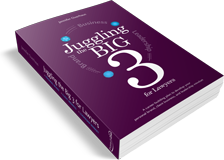Brand
Business
Leadership

“This book tells you all you need to know about how to get on.” The Times
“Relatively few books have been written with assistant solicitors in mind, about how to succeed at the business of being a lawyer… fewer still have devised a programme for so doing that runs alongside a book. This book does both.”Law Society (The Law Management Section)
5 star rating HR Magazine
 It’s not only a new year, but also a new decade. In light of this, you’ve probably set yourself a few resolutions (lose weight, drink less, exercise more) and hopefully written down some specific work-related goals, along with a written plan for achieving them. (If you haven't done the latter, as described in my previous blog entry, I strongly suggest doing so.) And then I urge you to commit to a self-review plan in which you evaluate your progress. At the beginning of each month, figure out your immediate goals and then (at the end of the month) treat yourself to a personal review!
It’s not only a new year, but also a new decade. In light of this, you’ve probably set yourself a few resolutions (lose weight, drink less, exercise more) and hopefully written down some specific work-related goals, along with a written plan for achieving them. (If you haven't done the latter, as described in my previous blog entry, I strongly suggest doing so.) And then I urge you to commit to a self-review plan in which you evaluate your progress. At the beginning of each month, figure out your immediate goals and then (at the end of the month) treat yourself to a personal review!
The truth is this: no one is going to care about your career as much as you, so, rather than rely upon your firm goal setting and appraisal structures (if they even have them) do it for yourself. Take the initiative.
Naturally, the more specific the goal, the easier it is to measure your progress toward it. But the single most important thing is that you monitor your goals regularly, maintain your focus, test your commitment, and feel confident that your goal continues to be the right one for you.
I’m reminded of the story about the frog and the pot of boiling water. If you put a live frog into a pot of boiling water, it will immediately jump out. However, if you put the same frog in the same pot with room-temperature water, it may notice that it’s no longer in optimal conditions ("Hey, what happened to my lovely pond?"), yet it tends to adjust. If you then gradually turn the heat up, the frog does nothing, and before he knows it, he’s actually in boiling water again—and voilà! Frog soup! In the same way, if you don’t keep your focus, life can creep up on you and subtly lower your powers of resistance.
Here’s a real-life example of this syndrome. Justin joined the litigation group of his firm, though he felt less than enthusiastic about it until he became involved in a case dealing with complex intellectual property (IP) rights. It wasn’t the litigation that enthralled him, but the fascination inherent in intellectual property issues. After the dispute was settled, Justin began working with his firm’s corporate department to create "standard practice" IP guidelines, which he then began marketing to clients. He realized that he truly enjoyed explaining how to organize and protect clients’ rights and helping clients implement their preferred strategies. He transitioned into the firm’s corporate department and built up a very satisfying practice specializing in these matters.
One day a client asked Justin to help reorganize their corporate intellectual property worldwide - in effect, his dream job. Gradually the size and importance of the engagement increased until Justin found himself working almost exclusively with this client, traveling around to their many locations, giving presentations, and implementing programs. He couldn’t have been happier! - or more trusted. However, when the client firm became involved in several contentious disputes, its board immediately engaged Justin to lead their defense, putting him back in the throes of a litigation practice. Despite this vote of confidence, Justin found himself inexplicably unhappy. He puzzled over it. After all, he was still working with the same client, and he was still immersed in subject matter he found profoundly interesting. What was wrong?
Only by stepping back and being honest did Justin realize that his new role neither played to his true strengths nor allowed him to do what he enjoyed, and that it was up to him to have the discipline to "just say no!" When his firm tried to persuade Justin to continue with the litigation and, in fact, even suggested that he use the experience gained to develop and market a (related) specialty practice, Justin steadfastly refused. He transferred the main duties of litigation to one of his colleagues and returned to doing what he loved: corporate IP strategy and development.
Had Justin not been focused on his personal vision, he might have found himself heading a litigation practice, which was not the right place for him (in spite of the fact that it was likely to prove extremely profitable). Instead Justin remained vigilant, and thrived.
Posted on 02/01/2010